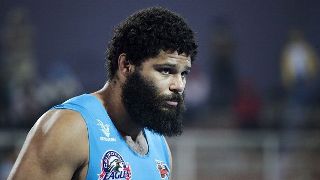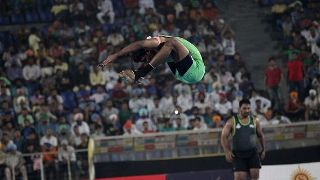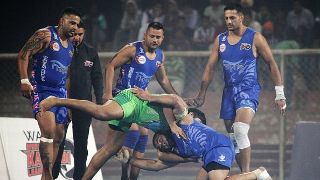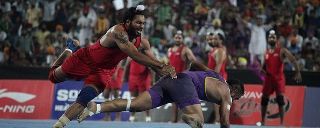|
It was chaotic, it was fun, it had visions of world domination, it was cut short too early. And now it's back in another avatar. The World Kabaddi League (WKL) returns as the Global Kabaddi League (GKL), starting on October 14 in Jalandhar. WKL has failed to match PKL for marketability, and the chaos in its first year was a sign of things to come. The league - this writer was part of the broadcast team - began with lofty ambitions, but as the months rolled on from August to December, functioned like a circus with the lionkeeper running the trapeze show and the clowns in charge of the lions. So just what made the whole shebang such a memorable affair -- and raises the promise that the GKL will be equally so? The charactersThe players themselves are stars on the kabaddi circuit, and go by two names -- their kabaddi name is usually an amalgamation of a nickname and their village name. Thus, Muhammad Ramzan of Lahore Lions was also Jaani Sanyaada, Balram Singh of Royal Kings USA became Boora Baggapind, and Lovepreet Sangha of the United Singhs, aka Neena Droli, impressed WWE enough to join their Performance Center after winning the WKL as their top raider, and has since enjoyed a career in WWE NXT as Kishan Raftar.  There was a former Canadian university wrestler called Mikhail Abdul Latif, who went by the name of Meek Seattle, and was just as comfortable using his wrestling background at pulling off stops as he was with conversing on science and technology, or playing the Turkish ney. Another non-Asian playing in the league was Hispanic-American Jairo Chavez, who wore a bandana when stopping for Vancouver Lions, and pulled off spectacular double-somersaults to celebrate every successful stop. One of those celebrations, sadly, brought about a muscle tear in his leg, which he failed to recover from and flew home. The bus from PakistanEight teams contested the WKL the first year, with three franchises having celebrity owners, and the one that would always attract great crowds were the Lahore Lions. Their raiders, the chubby Shafiq Chishti and the lithe Akmal Dogar, provided a study in contrast in how to raid effectively, while stoppers like Ramzan were very effective at snuffing out opposition raiders with their strength.  Lahore were like past Pakistan cricket teams -- talented and effective, yet emotionally fragile and given to expressing their displeasure with the officiating. Their appearance on the mat any day was subject to a few conditions -- the level of fitness of their squad, the ease of renewing their visas for trips across the border, or the amount of traffic on NH1 either side of the border. The contenders who checked themselves outYO YO Tigers, based in Toronto and co-owned by rapper Yo Yo Honey Singh, were one of the solid performers in the early part of the season. As the matches wore on, though, there were rumours of non-payment to players and general fiscal problems in the franchise. All of it came to a head one of the final few weekends, when the team was reportedly told to vacate their hotel one evening before a match. They never played a game again, and their fixtures removed just like that. The (referral) method in the madnessThe organisers introduced TV referrals in the first weekend in London's O2 arena. The league's technical director, an elderly Punjab Police official called Shivdev Singh, wasn't very good with a monitor by his side, though. After a few missteps, it was decided to let him remain as the face of the TV referrals, but another front was set up with younger umpires, who sat by the production control room, and reviewed decisions on replays. The decision would then be conveyed to Shivdev, with repeated calls on a walkie-talkie saying "Ok Bittoo, chheti kar Bittoo (hurry up, son)", who would hold up a placard for the team winning the referral. He even got that wrong once, showing a board for a team that was relaxing in their hotel rooms.  Where it went wrongThe WKL returned briefly in 2016, but it was obvious in 2014 that the budgets had been massively underestimated. There were also rumours of the league's inability to travel to nine countries across four continents as planned, due to a mushroom cloud of rumours over the possibilities of potential drug trafficking and kabootarbaazi (mass undocumented immigration, often to Europe and North America). Hopefully, this edition, with control of the league extricated from the then state government of Punjab to the franchise owners themselves, will be better organised with finances and logistics. With only one franchise, California Eagles, continuing into the third season, there should be some lessons passed on what not to do. NBA commissioner Adam Silver was in Mumbai in December that year, about a week after the final in Mohali, and commended "that kabaddi league" referring to the WKL, saying how it had shown India wasn't far off from producing athletes who could be in the NBA one day. A mark of the popularity of the format (as was this: ahead of a 2018 World Cup match, England were filmed playing this version of the sport). Silver had come to engage with the Indian media in promoting the Sacramento Kings, co-owned by Indian-born businessmen, Vivek Ranadivé and Raj Bhathal Sacramento, incidentally, was the first city on the North American leg of the league, and when Bhathal began chatting about the WKL, his first response was, "Oh, why didn't you guys come? The Indian community had sold out the stadium and we were looking forward to throwing a grand party for all of you. You really missed out a great opportunity."
|

